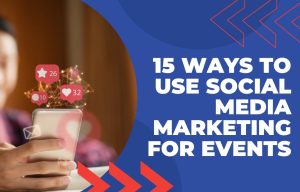Have you noticed lately that conferences are using social media groups to bring event attendees and alumni together? There are a couple of good reasons they are doing this. In this post, we’re going to look at why you should engage event attendees in social media groups.
1. It will keep your event on attendees minds.
One of the best ways to get more attendees to your event is through word of mouth marketing. If your attendees are talking to people in a group about the upcoming event, they will be more likely to mention it in other posts on social media, adding to the word of marketing exposure for your event.
2. It will help attendees get to know you, the sponsors, and other attendees.
Feeling comfortable at an event where networking is involved can make the difference between a positive and negative conference experience. If people are able to connect with each other online before they meet offline, it will make those networking experience much smoother and easier, and thus make everyone feel like they had an overall positive experience at your event.
3. It will lower cancellations.
If someone registers for your conference early and doesn’t think about it for a while, and your event allows cancellations, they might get disconnected from the reason they registered for the event in the first place. This disconnect could lead to more cancellations. By having them join an active group with other attendees, they will stay connected and excited about your event, and thus will be less likely to cancel.
4. It will give you a place to market upcoming events.
Once the event has ended, you will have a great customer database of people to market your next event to. Your group can be another option to marketing upcoming events to ensure that people hear about them.
5. I will give you a place to collect valuable feedback.
Tired of only getting half or less of your feedback forms back, or only getting them from people who have something to complain about? Your social media group will give you unmoderated access to both the positive and negative feedback about your event, before and after it has taken place. The feedback you receive before may help you make some slight modifications to ensure a successful event, and the feedback you receive after will help you create a better experience for future events.
Social Media Group Options
Now that you know the benefits, here are three social networks you can use for your event group, plus the pros and cons of each. For the sake of consistency, you should just choose one as you want to bring your attendees together.
Facebook Groups
Facebook is a top choice for conference groups due to its size and usability. With 936 million members actively using the site on a daily basis, you can be assured that most of your attendees will be logged into Facebook, and thus able to engage in your group.
If you want to be sure if your event’s registered attendees are on Facebook, take your list of current or former attendees and upload it to Facebook’s Custom Audiences. This will give you a count of the number of people it can match to Facebook accounts based on email addresses or phone numbers. And remember that just because it doesn’t find a match doesn’t mean they aren’t on Facebook – it just means the email or phone number searched wasn’t linked to their account.
The pro to Facebook groups, aside from the fact that most people use them, is that group posts tend to have a better reach than posts from a Facebook page. If you get people to join the group for this year, you will have a better chance at reaching them next year.
The con to Facebook groups is spam. If you create a group for your conference that is searchable (as all Public and Closed groups are), you have the potential to get a lot of unwanted requests to join. Hence, if you want to create a private community for your attendees, a secret group is the way to go. Note that you won’t be able to change the privacy from secret to public, so be sure that is what you want from the start.
LinkedIn Groups
If your attendees are mostly business focused, then LinkedIn groups are a great alternative to Facebook groups. While not as trafficked as Facebook, LinkedIn groups allow you to email all of the members of your group, similar to what you could do with an email list. Hence, you could either create a group for attendees only or a group for fans of the conference. You can then market future events to these members.
Google+ Communities
Last on the list is Google+ Communities. While Google+ offers an option comparable to Facebook and LinkedIn, you do face two challenges with their platform. First off, depending on your industry, you may have less attendees using Google+ compared to other social networks.
Second, Google+ is in the process of potentially breaking up their networks, so the future of Google+ Communities is uncertain. On one hand, no one has said definitively that Google+ Communities are in danger. On the other hand, Google has been known to shut down major services, regardless of the number of users.
Those things being said, one of the perks to Google+ Communities is that you can run them as your business. People can participate in them as their business too. So instead of running a group with your personal profile, like you would have to do on Facebook or LinkedIn, you can run it as your business page.
In Conclusion
As you can see, creating social groups for your event or conference can have great benefits for your business and your attendees. If you haven’t already, be sure to consider adding social media groups to your event marketing strategy today!




